
Impact Report: Celebrating Our First 15 Years of Supporting Principled Entrepreneurs from Global Growth Markets


Impact Report: Celebrating Our First 15 Years of Supporting Principled Entrepreneurs from Global Growth Markets
At the Legatum Center for Development and Entrepreneurship at MIT, we deeply believe in the power of entrepreneurship and innovation to create lasting prosperity across global growth markets. Guided by the vision of the center’s co-founders, Legatum and Iqbal Quadir, we have remained steadfast in our commitment to amplify the ambitions of entrepreneurs dedicated to solving some of the world’s most pressing challenges by leveraging cutting edge science and innovation.
We are thrilled to mark our first 15 years with this impact report. The report captures the chapters of our own journey and accomplishments as well as the incredible stories of some of the fellows that we have supported over the years. It details the transformative impact we have had on individuals and their teams, on solving for opportunities across the globe, and on changing the conversation about the role of entrepreneurship in achieving prosperity within growth markets.
As you read this report, you will discover stories of resilience, innovation, and collaboration. You will witness how entrepreneurs who leverage innovation are effective change agents, and why innovation matters to global prosperity. Working with our Legatum Student Fellows and the more experienced MIT Foundry Fellows, we continue to learn about the particular challenges that entrepreneurs face when they serve high-growth, complex markets. By working on the ground delivering bootcamps, engaging with university leaders, and convening the venture capital community, we have a growing role in thought leadership, exploring the intersection between entrepreneurship and development. Our approach is reshaping the dialogue to center attention on
entrepreneurship as a driving force for prosperity and peace. We hope that, like us, you see how our work is aimed at catalyzing impactful change.
As a reflection of the center’s work, this report serves as a testament to the unwavering dedication of the individuals who have been part of the Legatum Center team over the years. Their work in support of the passion and dedication of our fellows has been tireless. With the generous support of our donors, we were able to support hundreds of entrepreneurs from across Africa, the Middle East, Asia, and Latin America, including 326 Legatum Student Fellows and 23 Foundry Fellows, in our first 15 years. In recent years, we have gathered in Botswana, Kenya, South Africa, Ghana, Senegal, Egypt, the UAE, and beyond. Together, we have built a vibrant community of entrepreneurs and innovation ecosystem stakeholders who are not only driving economic growth, but who are also creating long lasting impact and building ecosystems for the next generation of entrepreneurs and innovators.
You will hear from fellows in the report acknowledging the role of the Legatum Center in creating a community of like-minded entrepreneurs—whatever the stage of their journey. We believe that for entrepreneurs to thrive, as they navigate the often-lonely path of venture building, they need their own community. In the face of the uncertainties and opportunities of today’s world, we all need a community that will support us. Today is a milestone when we have the chance to welcome all of you into our community, and to celebrate our fellows. We hope that you will continue to be part of our community and support our entrepreneurs and innovators in their bold ambitions.
We are excited to continue our journey, fulfilling the vision of the center and leveraging the deep insights of our first 15 years to chart our future path.
We invite you to join us as we celebrate our achievements, reflect on our challenges, and recommit ourselves to the pursuit of building a more prosperous world, through entrepreneurship and innovation.
Warm Regards,
Professor Dame Fiona Murray DCMG CBE Associate Dean of Innovation MIT School of Management Faculty Director, Legatum CenterDina
H. Sherif Executive Director, Legatum Center Senior Lecturer MIT School of Management
The Legatum Center for Development and Entrepreneurship at the Massachusetts Institute of Technology (MIT) was founded in 2007 with its vision and mission centered on the belief that entrepreneurs and their innovation-driven solutions are key to advancing global prosperity.
Our co-founder, Legatum, a global investment partnership whose mission is to generate and allocate the capital and ideas that can help others prosper, envisioned a place that would not only educate, but would also lead the conversation on how the success of entrepreneurs globally would mean greater prosperity for all members of society.
Since our establishment, the Legatum Center at MIT has carried that vision by delivering programs and research that demonstrate the transformative power of entrepreneurship on global growth markets. Through our work, we have helped shift the narrative about these markets from one of lack and stagnation to one of abundance and opportunity. In the time that the Legatum Center has thrived at MIT, the recognition of the importance of entrepreneurship in achieving global peace and prosperity has grown; and the center and its extraordinary community of alumni have been essential to that change.
At MIT, our work has long been anchored in our flagship Legatum Student Fellowship, which provides a tuition subsidy and a tailored curriculum focused on how to effectively launch and grow impactful ventures in growth markets, alongside likeminded peers, and with the support of world-class professors and advisors. Fellows come with ambition and commitment

and leave MIT deeply embedded in a community of principled entrepreneurs who support and amplify their goals with an understanding of the particular challenges of building startup ventures in growth markets.
In our first 15 years, the Legatum Center provided US$10,335,294 in tuition support for 326 Legatum Student Fellows from 57 countries. These fellows have raised an estimated $932 million in funding and created at least 17,000 direct jobs. Their work has changed the lives of countless others as they serve more than 17 million customers across 170 countries.
While the impact of the Legatum Student Fellows on their focus markets is evident in what they have achieved to date, their future impact as entrepreneurial leaders is inestimable. Despite the pressures of family obligations, expectations to pursue traditional career paths, and student loans post-graduation, a full 56% of fellows are pursuing careers focused on entrepreneurship.
As we examine the impact that the center’s programming and support has had on our fellows as individuals and as leaders, we clearly see the path to continue building from this strong foundation. We have listened to our community, and we have learned what factors have contributed to offering the right kind
This report celebrates 15 years of educating and supporting entrepreneurial leaders from global growth markets.
Legatum Student Fellows and Foundry Fellows explore Cairo as part of an innovation and entrepreneurial ecosystem tour.
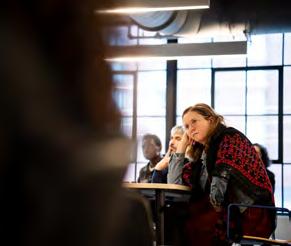
Over 15 years, we have built a strong foundation of impact on our fellows and wider community of entrepreneurs from growth markets.
of support at the right time. For our Legatum Student Fellows, the unique value of our support came in the form of:
1. Community: The majority of surveyed student fellows (85%) feel the fellowship helped improve their overall experience at MIT, and 80% believe that a key aspect of the fellowship was the space to meet like-minded people; 59% felt that the fellowship created a safe environment for honest conversations; 66% are still in contact with their cohort, and a substantial majority (86%) would like even more connection with the Legatum Center community in the future.
2. The Right Kind of Support: 98% of surveyed student fellows strongly believe that the fellowship was a valuable experience in terms of: financial support, an expanded ability to start a venture, the decision to pursue or proceed with an entrepreneurial path, and an ability to move away from corporate or consulting jobs. The fellowship had a significant impact on their confidence and capacity to pursue entrepreneurship and innovation-driven venture building in growth markets.
3. Ties to Emerging (Growth) Markets: 96% of surveyed student fellows believe that the fellowship helped them gain useful skills, knowledge, and insights; and 88% believe that the fellowship helped them better understand the problem they are tackling on the ground and how to refine their solution. They valued gaining a better understanding of venturebuilding in growth markets, and access to connections, mentorship, and in some cases venture capital.
4. Unique Value Proposition: The emphasis on the cohort experience and values-based leadership, and the focus on growth markets, are perceived by student fellows from all cohorts as differentiators of the Legatum Center, with several of the interviewed fellows noting that they did not experience this anywhere else on campus at MIT. A remarkable 90% of surveyed student fellows believe that the fellowship helped them identify and define their core values as entrepreneurs. It made them more thoughtful about their work, better connected to their ‘why’ and the values that drive their work, and able to work on a venture that they are passionate about.
5. Emphasis on Venture Creation: The venture-creation results of the center—with 286 ventures created, 75% of which still exist today—compare favorably with other entrepreneurship programs, including at MIT. Half of all fellows created and registered a venture within two years of their fellowship, with some creating more than one venture. Of the ventures that were created within two years of the fellowship and still exist, they have survived for an average of nine years as of 2023.
Moreover, our off-campus fellowships and global initiatives have succeeded in creating a path for MIT to go out to the world, with
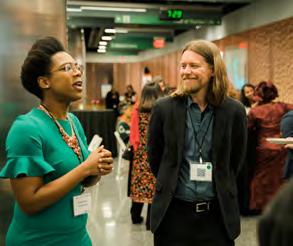
an initial focus on Africa. We offer non-student entrepreneurs the opportunity to access tailored programming from MIT faculty and global experts, while also bringing their perspectives back to MIT. Our Foundry Fellowship, supported by the Mastercard Foundation, has secured MIT’s presence in vibrant innovation ecosystems across Africa by supporting leading entrepreneurs who serve as role models for the next generation of leaders.
As of 2023, in addition to supporting the 326 Legatum Student Fellows, the Legatum Center:
• Engaged 23 experienced entrepreneurs from ten diverse markets across Africa in the Foundry Fellowship, a transformational experience focused on leadership skills to strengthen Africa’s innovation and entrepreneurial ecosystems;
• Delivered bootcamps on market-creating innovations and commercialization of deep technologies to over 225 entrepreneurs from Africa;
• Produced research and disseminated insights on entrepreneurship in growth markets through events, case studies, blogs, white papers, conferences, global immersion experiences, and other influential avenues; and
• Raised over $40 million from donors to support our mission.
Our unique approach—and the center’s position as an important bridge between MIT and global growth markets—make the Legatum Center uniquely able to innovate on its offerings and expand its global impact in future years.
The Legatum Center is an important bridge between MIT and global growth markets.THE LEGATUM CENTER AT MIT
US$40M raised from donors to support our mission
LEGATUM STUDENT FELLOWSHIP
In our first 15 years, the Legatum Center at MIT provided $10,335,294 in tuition support for 326 fellows from 57 countries STUDENT
286 ventures created 75% of ventures active today 17+ million customers served in over 170 countries
17,000+ direct jobs created $932,363,900+ capital raised $660+ million in annual revenues
FOUNDRY FELLOWSHIP
established African entrepreneurs from Nigeria, Egypt, Kenya, Botswana, Ethiopia, Ghana, Rwanda, South Africa and Zambia
79% of fellows changed their venture strategy to focus more on expansion within Africa, and;
64% were able to build partnerships with stakeholders in new ecosystems
MARKET-CREATING INNOVATIONS BOOTCAMPS
149 early-stage entrepreneurs in Senegal, Rwanda, Uganda, Nigeria, and Kenya
99% of participants gave the program a perfect score when evaluated
BRIDGING RESEARCH AND INNOVATION BOOTCAMP
14 deep tech startups
70 participants in ideation workshops in Tunisia
USADF ACCELERATOR
25 African entrepreneurs of technology companies enrolled
THOUGHT LEADERSHIP
7 research publications
13 business cases on growth market ventures
65 events and webinars
53 blog posts










Founders Focus Country Focus Sector
Mohamed Aburawi Student Fellow (2020-2021)
Oluwasoga Oni Student Fellow (2015-2016)
Genevieve Oni Student Fellow (2017-2018)
Aukrit Unahalekhaka Student Fellow (2015-2016)
Libya Healthcare
Nigeria Healthcare
Thailand Agriculture
Fernanda de Velasco Student Fellow (2015-2017)
Kevin Kung Student Fellow (2013-2015)
Joyce Kamande Foundry Fellow (2023)
Adetayo Bamiduro Student Fellow (2014-2015)
Chinedu Azodoh Foundry Fellow (2022)
Arjun Nair Student Fellow (2009-2010)
Mexico FinTech
Kenya Agriculture
Nigeria Transportation
India Education
Venture

Speetar
A telehealth provider that offers accessible, affordable quality healthcare in conflict-affected communities
MDaaS
Bringing modern, tech-enabled healthcare to clinically-underserved communities across Africa
Ricult
A data science company that develops digital solutions for small-holder farmers across Asia
Play Business
Helping thousands of Mexicans become first-time investors, while also providing financing for SMEs.
Safi Organics
Eradicating poverty by using technology to decentralize, manufacture and sell high yielding organic fertilizer
MAX
Providing commercial drivers with subscriptions for high-performance and low-emission vehicles
Great Learning
India’s leading professional learning and higher education company
Impact Summary
2M customers
260,000 patients served
1,300 clinical partners
25 Nigerian cities
850,000 farmers in Thailand and Pakistan engaged
500,000 acres of land imaged
150+ SMEs financed
150,000 platform users
8,000 recurring investors
10,000 farmer-customers
50% increase in farmer income
30% increase in farmer yields
36,000 drivers in 14 cities
65% increase in daily income
190M kilometers covered in 20M trips
52+ metric tons of CO2 saved
9M customers across 170 countries
Legatum Center for Development and Entrepreneurship at MIT 11
This report provides a snapshot of our past, present, and future. Here we share the key results, learning, and impact from our first 15 years, as well as our plans for an exciting future direction.
The findings in this report rely on analysis of data and information from our internal monitoring and evaluation reports, our 10-year impact report, and our extensive database of fellows. Additional research was conducted on student fellows to identify information on their current work focus, including region of operation, industry, career type (e.g., entrepreneurship, corporate, government, etc.), market type (growth market or developed market), number of ventures established, number of existing ventures, and amount of capital raised. We primarily relied on LinkedIn and Crunchbase and were able to source information for approximately 94% (306) of our student fellows for all listed data points, except for jobs created and capital raised, which were harder to identify through secondary research.
We distributed a survey to all 326 Legatum Student Fellows, of whom 90 (28%) responded, providing us with a sample that covers all cohort years. The survey addressed current occupations, career paths, entrepreneurial journeys, and engagement with venture building since graduation, and asked about impact in terms of jobs created and capital raised.
Another survey was circulated to our database of 23 Foundry Fellows, with 15 respondents providing insights on the impact of the fellowship experience on their networks, ventures, and roles as ecosystem players.
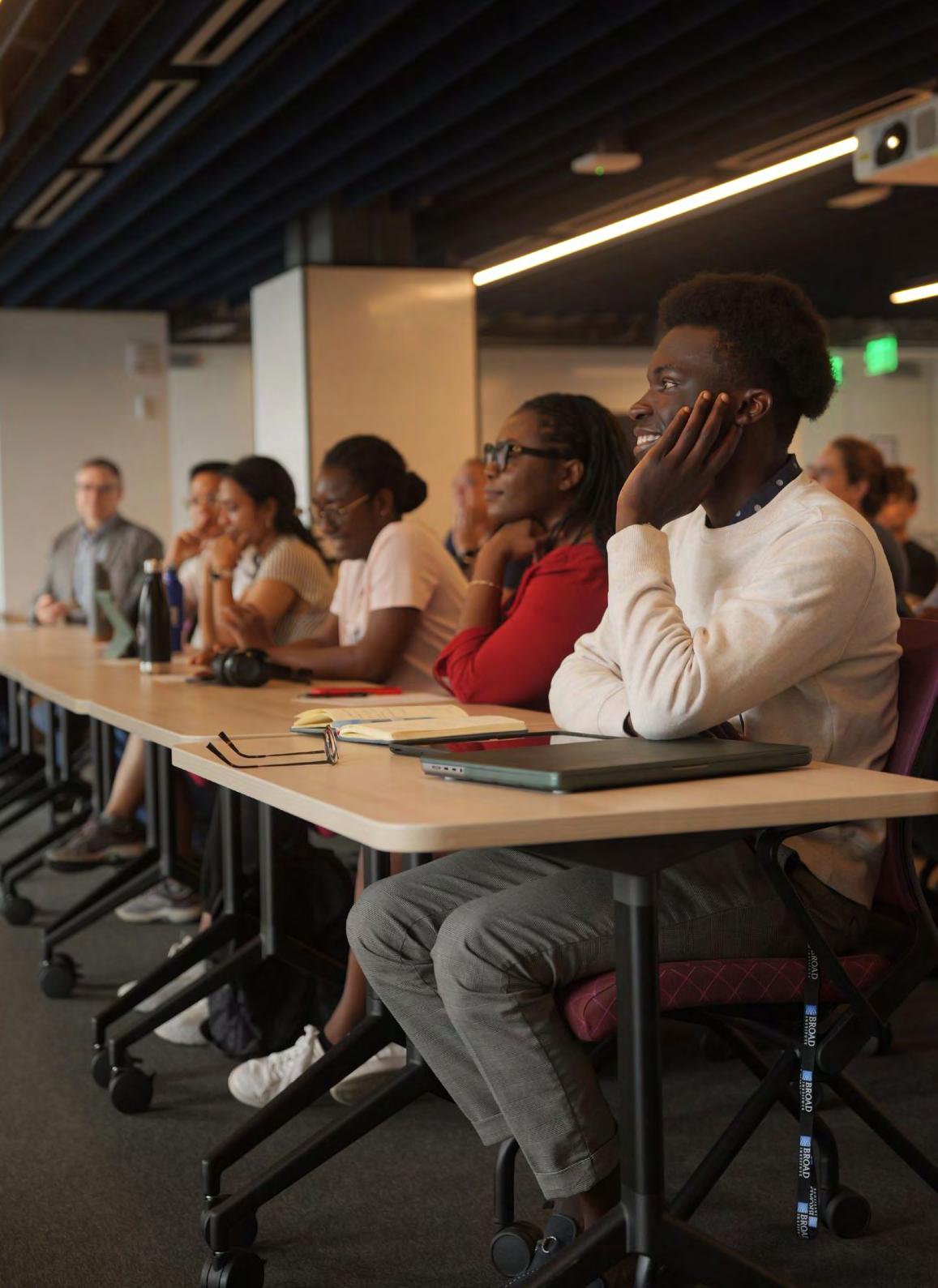
“The fellowship was the catalyst that bridged my expertise with my passion for innovation and social entrepreneurship. It provided the foundation for launching and scaling my venture.”
– Legatum Student Fellow (2010-2011)


By the early 2000s, it was increasingly clear to international development stakeholders, practitioners, and policy makers that traditional aid paradigms alone were insufficient to solve pressing social and economic problems globally.1 At the same time, there was a growing recognition that a robust private sector was critical to creating prosperity in ‘developing economies’.2 Against this backdrop, the past two decades have seen a growing shift in economic growth in these markets, with their young and growing populations, large consumer bases, and a strong capacity for innovation, resilience, and adaptability.
Bottom-up venture creation is essential for growth markets to build resilient economies, usher in sustainable economic growth, and create jobs for the future. Entrepreneurial activity can lead to sizable increases in per-capita incomes. India is a perfect example, as startups there may account for up to 5% of GDP.3
Globally, small businesses account for 50% of employment creation.4 However, the real power of entrepreneurship is not the creation of small- and medium-sized enterprises, but in generating innovative enterprises that are addressing the needs of local markets while having the potential for global reach; leveraging local and international talent; and adopting, building on, and enhancing technological innovations, locally and internationally.
The Legatum Center recognizes that innovation-driven enterprises (IDEs) are uniquely able to solve significant problems, and thus offers programs that support entrepreneurs to develop these kinds of ventures. Solutions to problems like the lack of affordable and accessible goods and services have been created by fellows at the Legatum Center since the beginning, for example Maximize Me—founded by Legatum Student Fellow Niki Gomez (2008-2009)—and Ginger—founded by Legatum Student Fellow Karan Singh (2010-2011)—bring affordable, Legatum Center for Development and Entrepreneurship at MIT
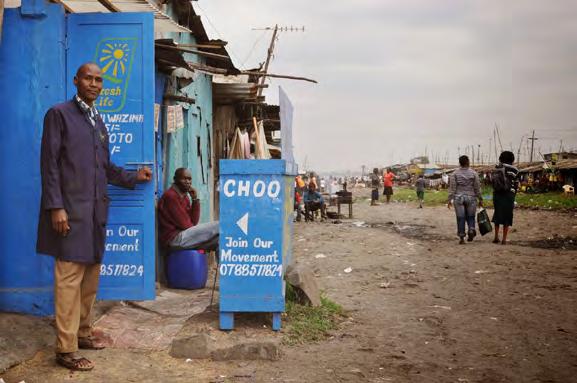
holistic wellness and mental health services to customers, while Sanergy—founded by Legatum Student Fellows David Auerbach and Ani Vallabhaneni (2010-2011) and Lindsay Stradley—brings scalable and sustainable sanitation services to millions of people living in urban slums in Kenya.
Our curricula are designed to support entrepreneurs to identify opportunities to create and build ventures that can address significant needs at scale. The lower competition, untapped talent pool, and presence of market niches make growth markets fertile ground for entrepreneurs to create new levels of impact. Technology-based models are creating needed jobs and sources of income. Noteworthy examples include bld ai—founded by Legatum Student Fellow Danny Castonguay (2011-2012)—which mobilizes a network of professionals across the Philippines, Egypt, Colombia, and other countries to offer professional outsourced services to global enterprises, and wherEX—founded by Legatum Student Fellow Francisco Puente (2018-2019)—which is the leading B2B procurement marketplace in Latin America. Other innovative models, such as Mexico’s PlayBusiness—founded by Legatum Student Fellow Fernanda de Velasco (2015-2016)—is the first of its kind equity crowdfunding platform that enables young people and first-time investors to generate much needed supplementary income. Fellow-created businesses are also enhancing the incomes and livelihoods of smallholder farmers, through ethical and fair trade practices, like Sudtana in Thailand—founded by Legatum Student Fellow Manusanun (Mew) Leelahongjudha (2017-2018)—and GRIA Food in West Africa—founded by Legatum Student Fellow Joshua ReedDiawuoh (2019-2020).

The Legatum Center for Development and Entrepreneurship at MIT was inaugurated in October 2008.
Legatum has long recognized the potential of entrepreneurship in generating wealth, addressing pressing social needs, and providing innovative solutions to complex socio-economic problems. It aims to use ideas, energy, and capital to support people all across the world to achieve prosperity, a holistic state combining wealth and wellbeing with a mutually reinforcing link between prosperous societies and prosperous individuals. This approach underpins Legatum’s significant high-impact philanthropic investments, and its comprehensive support to encouraging and empowering entrepreneurship.
Separately, Iqbal Quadir, who came to America from Bangladesh as a college student in 1976, was fascinated by the contributions of entrepreneurs to the American economy. He observed that many such entrepreneurs started with little money, if any, and ended up very wealthy, while providing goods and services to their fellow citizens. He observed that entrepreneurs create capital and make themselves and their societies richer—and concluded that this is what his native Bangladesh needed. From 1993 to 2001, Quadir pursued the American entrepreneurial approach in Bangladesh and created a multibillion-dollar company. He arrived at MIT in 2005 and persuaded its professors and administrators that a center for entrepreneurship for developing countries would contribute to global prosperity, while helping MIT students become entrepreneurs in these countries.
In 2007, Quadir met with the leadership of Legatum and they agreed to partner on the establishment of the Legatum Center for Development and Entrepreneurship at MIT. The center was inaugurated in October 2008 by senior MIT professors and administrators, along with Legatum leadership. Quadir led the center as its Director from 2007 to 2014 and taught a class on entrepreneurship as a Professor of Practice from 2009 to 2014. In order to build up the visibility of the center, he published articles in prestigious magazines and newspapers (e.g. Science, Nature, Harvard Business Review, the Wall Street Journal, and MIT-Pressbased Innovations) and hosted prominent global entrepreneurs, Nobel Laureates, heads of states, and professors from MIT and other universities.
Legatum Center for Development and Entrepreneurship at MIT
Although the center was initially housed in the MIT School of Architecture and Planning, it supported graduate students from all five schools at MIT from the beginning. However, the majority of students at the center were from MIT Sloan School of Management, and Quadir’s course was also located at that school.
After about 200 students had benefited from the action-oriented fellowships and financial support offered at the center, Quadir wanted to return to the entrepreneurial “practice” part of his life. It was also understood by everyone that the center could benefit from better integration with the rest of MIT. Thus in 2014, the center was relocated at the Sloan School and began to be led by Professor Dame Fiona Murray DCMG CBE, the Associate Dean for Innovation and a faculty member of the Sloan School.

A new stage of growth began in 2014. We had repositioned ourselves both physically and strategically by moving to Sloan, which gave us greater proximity to many of our students and allowed for stronger links to faculty whose underlying disciplines—management, leadership, organizational change, and entrepreneurship—were central to our mission.
Under the leadership of Professor Murray, Georgina Campbell, an MIT alum, was hired as Executive Director. We made a conscious decision to embed the center further within the MIT ecosystem and focus on building connections and community. We worked to create and enhance synergies and collaborative partnerships between our center and other MIT departments, labs, and centers, and increase awareness of our work at MIT. We also worked to integrate our fellows into other relevant MIT support systems.

By 2019, we were recognized as a well-integrated member of the MIT community and thus saw significant growth in student interest in the fellowship. At this time, with Georgina returning to her home country, Fiona hired Dina H. Sherif to serve as Executive Director. Dina had been an entrepreneur in Egypt, had significant investment experience, and had demonstrated an ability to lead a thought leadership strategy that would further the center’s mission. Having also founded the Center for Entrepreneurship at The American University in Cairo, which had a heavy focus on the Middle East and Africa, Dina brought a new network to the Legatum Center that helped quickly expand its global footprint.
At this time, we refined the Legatum Student Fellowship program, adding further rigor by moving away from the heavy focus on tuition support and toward a deeper focus on entrepreneurial
In 2014, the Legatum Center moved to the Sloan School of Management.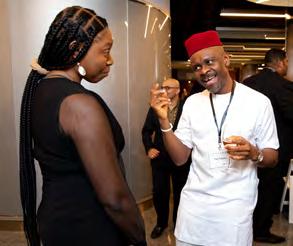
capabilities and dedication to building a venture in a growth market after graduation. We reduced the level of financial support provided and adopted a more structured approach in the screening of candidates and in the creation of the cohorts. These changes increased the program’s competitiveness and ensured that only committed and ambitious candidates were accepted. The refined program reflected our growing emphasis on the viability and sustainability of the ventures our students aspired to create, build, and scale.
After 2019, we set a goal to attract and recruit an increased number of women to our fellowship program and wider activities. We did this because of the well-documented correlation between gender equality and economic prosperity, and to do our part to help increase the number of female entrepreneur role models, especially in growth markets. We also sought to ensure that guests at our panels, roundtables, and events included inspirational women and men from global growth markets, so that our students could connect with, and learn from, a range of mentors with a wide variety of expertise and insights.
Beyond campus we developed new educational experiences for a broader range of entrepreneurs in growth markets. Our goal was to ‘take MIT to the world’ so that we could learn from and connect with entrepreneurs in growth markets. We developed bootcamps, to share MIT’s approach to entrepreneurship, and the Foundry Fellowship, to support successful entrepreneurs to take on bolder ecosystem-leadership roles. While this initial phase of expansion has focused on delivering programming to both well-established and early-stage entrepreneurs in Africa, we plan to explore new opportunities in other markets in the future.
The center has increasingly emphasized the viability and sustainability of the ventures our Legatum Student Fellows aspire to create, build, and scale. Legatum Center for Development and Entrepreneurship at MIT
Finally, we have now expanded our base of supporters, who, with Legatum, now include the Mastercard Foundation, HRH Princess Moudi Bint Khalid, and the Jacobs Foundation, in addition to several successful, growth-market-based entrepreneurs.
Here at the Legatum Center, we hold a firm belief that entrepreneurship is a key driver of sustainable economic growth. We see entrepreneurs as a decentralized force— resilient, innovative, and adaptive in an era of rapid change and transformative technologies. Our Theory of Change is rooted in the idea that creating opportunities for the interdisciplinary exchange of ideas, and for peer-to-peer learning and mutual inspiration, fosters innovation. At MIT, we refer to this as “serendipity,” the ability to make unforeseen discoveries.
To advance our mission, we have established a growing ‘community of communities’ whose members—entrepreneurs, investors, policymakers, and academic institutions—are deeply engaged and are:
• Leading high-impact ventures;
• Building the innovation and entrepreneurial ecosystems required for growth markets to thrive; and
• Creating opportunities to reach prosperity at scale, through job creation and global competitiveness.
The effectiveness of our approach is evidenced by the increase in the number and impact of innovation-driven enterprises, the number of research and business cases from our fellows’ ventures in growth markets, the choices and paths that our fellows pursue after completing their programs, and the principled leaders who have learned and been supported through our unique offerings.
Impact Pathways
Interventions
Team, Partnerships, and Funding
Entrepreneurs and their market-driven solutions are critical to advancing sustainable prosperity across global growth markets.
Create an established ‘community of communities’ whose members (entrepreneurs, investors, policymakers, and academic institutions) are deeply engaged and are: I) leading high-impact ventures; II) building the innovation and entrepreneurial ecosystems of growth markets; and III) creating opportunities for prosperity at scale, including job creation and global competitiveness.
Pathway 1: Learning Experiences
Programs foster principled entrepreneurial leaders and improve venture effectiveness; ventures then create their own impact on their respective markets.
Programs lead to meaningful connections and collaborations; entrepreneurs leverage the Legatum Center community to identify opportunities across global growth markets.
Programs provide access to worldclass learning in growth markets while bringing necessary insights and perspectives back to MIT.
Pathway 2: Thought Leadership
Thought leadership aims to shift the narrative on growth markets and enhance the relevance of entrepreneurship activities, especially for innovation-driven enterprises focused on science and technology.
The center brings investors to the table to consider the ways in which the venture capital community and other wider financial institutions shape the conditions for change in growth markets.
The center collects data, debates, explores, and disseminates insights and knowledge to and from a diverse set of ecosystem stakeholders.
On-Campus Learning Experiences:
• The Legatum Student Fellowship
• Events hosted at the center
Global Learning Experiences:
• The Foundry Fellowship
• Market-Creating Innovation Bootcamps
• Bridging Research and Innovation Bootcamps
• United States African Development Foundation Accelerator
• Events and webinars hosted and initiated by the center
• Speaking engagements
• Business cases focused on global growth markets
• Research studies
A strong and sustainable organization with the capacity to amplify the visibility and impact of innovation-driven entrepreneurship in growth markets Legatum Center for Development and Entrepreneurship at MIT

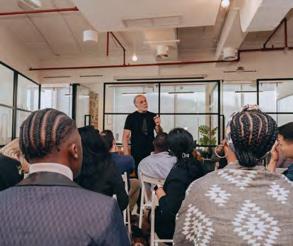
Our principles build on those of the broader MIT entrepreneurship community, and also on those in the MIT Sloan mission statement and the Martin Trust Center for MIT’s Entrepreneurship Principles of Operation. These principles underpin our approach and guide all levels of our program design and delivery.
• Improving Lives: We mentor, support, and learn from innovation-driven entrepreneurs and ecosystem stakeholders so they can create and scale businesses that have the ability to contribute to prosperity through their innovation, product, or service.
• MIT Standard of Excellence and Rigor: We work with MIT faculty and partners to incorporate MIT’s standard of excellence and rigor into everything we do.
• Collaboration: We capitalize on and contribute to our distinctive intellectual excellence and entrepreneurial culture by working closely with other MIT departments, labs, centers, groups, alumni, and partners.
• Diversity: Our team, fellowship cohorts, lecturers, and program participants represent a range of perspectives, especially including those from growth markets. We do our utmost to ensure a diversity of intellectual viewpoints and high ethical standards in all that we do.
• Experimentation, Evaluation, & Iteration: We foster an adventurous learning community. Each year, we try new activities and partnerships to enhance our students’ educational experience. If we fail, we learn in the process. When we succeed, we scale rapidly.
• Honest Broker: We aim for our students to have a clear understanding of their investment and partnership options before they make a decision on whether to exchange a part of their business for additional funding.
• Mens et Manus: True to the motto of MIT, in all our program offerings, we operate on a hybrid model that fuses academic and practitioner perspectives.

An important part of our approach is the emphasis on principled and values-based leadership.
“A lot of classes at MIT talk about entrepreneurship… less classes talk about [a] strong set of values as an entrepreneur.” Student Fellow, 2022-2023 cohort
In supporting emerging and established entrepreneurs, our approach is one that combines principled and values-based leadership with systems transformation and community building as essential components in unlocking innovationdriven entrepreneurship’s power to achieve global prosperity.
We ground our fellows in how character, principles, and values impact leadership, and by extension, the ventures they create. We believe that market-driven, innovative ventures that are rooted in principled entrepreneurship and guided by values are uniquely positioned to address society’s biggest challenges, while creating lasting prosperity.
Innovation-driven entrepreneurship is a catalyst for systems transformation. We give entrepreneurs the tools they need to create business models that transform existing systems, solve problems at scale, and create jobs and prosperity. We connect, convene, and enable ecosystem stakeholders to develop longterm collaborative solutions that embrace innovative ideas and leapfrog toward global competitiveness.

The wider Legatum Center community includes not only our fellows, but also entrepreneurs, investors, and thought leaders from around the world.
We work to foster a strong sense of community at different levels: within all fellowship cohorts, among our growing community of alumni, and through robust networks of stakeholders who are instrumental to the development of inclusive and sustainable entrepreneurial ecosystems. We harness the power of this community of visionaries to co-create the conditions needed for the promotion of innovation-driven entrepreneurship in global growth markets.
Legatum Fellowships & Learning Pathways
We provide the tools, resources, and community needed for emerging and established entrepreneurs to build scalable businesses that transform existing systems and solve pressing social and economic problems.
Legatum Foundry Fellowship
Legatum Student Fellowship
Capacity Building Bootcamps
Student Engagement Programs

• Legatum Student Fellowship: This one-year fellowship is designed to provide MIT students who are interested in building ventures in global growth markets with the space and resources to design their ventures with like-minded peers and the support of world-class advisors. We build a cohort of 20 to 25 student fellows each year, who all share the same profile: passion for the problem they are trying to solve, a deep understanding of the growth market they are trying to serve, and the commitment to being a principled entrepreneur focused on systems-level change. The student fellowship offers a tuition subsidy and a tailored curriculum to maximize the likelihood of success in launching and growing their ventures.
• Foundry Fellowship: This six-month program is a transformative experience for accomplished entrepreneurs who are committed to leading the acceleration and interconnection of Africa’s innovation and entrepreneurial ecosystems. Supported by the Mastercard Foundation, a cohort of 10 to 12 fellows are accepted each year, and the
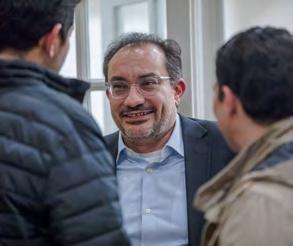
Our bootcamps and accelerator enable entrepreneurs in growth markets to access world-class learning and the community of the Legatum Center.
program guides them to work collaboratively to move beyond current inflection points and define the next stage in their entrepreneurial and leadership journeys. The curriculum includes personal leadership seminars, coursework with MIT faculty, and experiential tours of four innovation ecosystems (cities).
• Market-Creating Innovation (MCI) Bootcamps: In 2020, we established a strategic partnership with the Clayton Christensen Institute to launch the Market-Creating Innovation Bootcamp (MCI). This dynamic three-day program is designed for idea- and early-stage entrepreneurs who are refining and piloting new ideas; it explores the principles and frameworks needed to create new markets and make products and services affordable for everyone. Supported by the Mastercard Foundation, the bootcamps offer a unique curriculum and build a community of entrepreneurs across the African continent. Bootcamps have been delivered with local partners in Rwanda, Senegal, Nigeria, Uganda, Ghana, and Kenya.
• Bridging Research and Innovation (BRAIN) Bootcamps: Deep technologies have the power to solve some of the world’s most pressing problems and create new opportunities for growth and innovation. This immersive bootcamp targets African researchers and scientists and equips them with resources and guidance to effectively commercialize technologies and grow ventures capable of pan-African expansion and scalability.
• United States African Development Foundation (USADF) Accelerator: This comprehensive online teaching and mentorship program is designed for tech entrepreneurs in Africa seeking to raise capital and scale their ventures. The program brings in leading experts from the Legatum Center, the Martin Trust Center and the MIT Energy Initiative, and features successful Legatum Student Fellow and Foundry Fellow alumni.

We produce research, content, and events that inform and shape thinking and policy on issues related to innovationdriven entrepreneurship in global growth markets. We also share stories of innovation from around the world. We are keen on the dissemination of innovative ideas, best practices, and insightful discussions from our own research or from other stakeholders through webinars, roundtables, and speaking engagements.
By convening and engaging diverse stakeholders, including entrepreneurs, policymakers, academics, and industry leaders, we foster a collaborative environment where cutting-edge research intersects with practical insights.


We measure progress in achieving our mission through the impact of our programs, which is based on the critical and unique support mechanisms we offer to entrepreneurs. The combination of what we offer and how we deliver is what supports our fellows and global community of learner-entrepreneurs to achieve positive social and economic transformation through their innovative and impactful ventures.
Today, the center’s position as an important bridge between MIT and global growth markets, focused exclusively on innovationdriven entrepreneurship as a driver of prosperity, makes the Legatum Center uniquely able to continuously innovate its offerings and expand its global impact. This report enables us to reflect on the value created since our founding and consider how to multiply that in future years.
Started right after graduation: 159 fellows created 194 ventures
Started 2+ years after graduation: 69 fellows created 92 ventures All
“[I’m proud of] providing access to high quality education for millions of learners around the world and creating several thousand jobs in India.” Student Fellow (2010-2011)
Cumulatively, student fellows have created a total of 286 ventures.
When MIT students apply to the Legatum Fellowship, they are required to have an existing venture or developed idea. Among the 326 student fellows, more than half (57%) actually created and registered a venture, either based on the idea they originally applied with, or in a closely related field, within two years of their fellowship; with some creating more than one venture. A total of 194 ventures were created within two years of the fellowship, out of which 69% (133) are still running. Ventures that shut down survived for an average of one year, while ventures that still exist have been around for an average of nine years.
In addition, 69 of our student fellows (21%) created new ventures two or more years after graduating from the fellowship, 27 of these had never created a venture before. A total of 92 ventures were created two or more years after the fellowship, 89% of which still exist today. Of the new ventures created post fellowship, those that closed down survived for an average of two years, while ventures that still exist have been around for an average of four years.
Of the 286 ventures created by student fellows, 75% still exist today.
Venture failure is influenced by both internal and external factors. Internal factors include poor management in governance, planning, and organizational dynamics; personal problems of founders; issues related to product innovation and fit; and little emphasis on stakeholder engagement.5 External factors include the regulatory context, business environment, and access to finance and investments.6 The higher survival rate for ventures created post-fellowship (89% of ventures created two or more years after the fellowship still exist today) is likely a result of the fellows’ maturity and professional development as they progressed through their careers after graduation.
Fellows have created 282 ventures, 76% of which still exist today. These ventures have raised nearly $1 billion in funding and created at least 17,000 direct jobs.
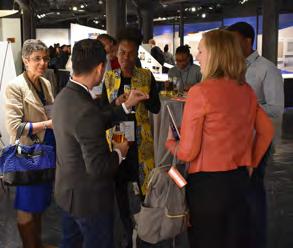
More than half of the Legatum Student Fellows lead a career focused on entrepreneurship.
While the data about capital raised and jobs created is harder to find through secondary research, publicly available information on 91 of our student fellows’ ventures, and survey responses from 90 of our student fellows, indicate these fellows have raised a total of $932,363,900 in equity financing, and directly created at least 17,000 jobs. The ventures of the surveyed student fellows collectively serve at least 17 million customers directly, with 59% of ventures targeting the base of the economic pyramid as customers.
The survival rate of ventures created by Legatum Student Fellows within two years of the fellowship (69%) beats overall survival rates for businesses in the US, which after 10 years is just 33%.7 As an educational institution, MIT considers venture creation a more important objective than venture survival. A comparison of the Legatum Student Fellowship with a similar, though not precisely comparable, program at MIT shows the following: after 10 years, 61% of the other program’s projects became real companies that either continue to exist or were acquired; 63% of all the created ventures from that program raised money, and those companies raised over $1 billion. Though the venture creation, survival, and funds raised metrics of this program are very similar to those of the Legatum Center, an important distinction is our explicit focus on entrepreneurs from growth markets.
As shown here, 40% of our student fellows currently lead their own enterprises, while another 15% engage in entrepreneurial ecosystems as senior executives of startups or investment funds. The second largest percentage of our student fellows are leading corporate careers (32%). Across all career tracks, 56% of our fellows lead a career that is focused on entrepreneurship.
Today, student fellow alumni live across 33 different countries. Of the active ventures they founded, 68% are focused on global growth markets, with India, Mexico, Kenya, Nigeria, and Brazil at the forefront. Ventures created by student fellows cater to customers worldwide.
Fig 3. Geographic distribution of active ventures by country“The fellowship was the catalyst that bridged my expertise with my passion for innovation and social entrepreneurship. It provided the foundation for launching and scaling my venture.” Student Fellow (2020-2021)
Fellows have created ventures in a wide range of sectors, with the largest active ventures focused in healthcare (17%); professional services (13%); financial services (11%); and information technology (10%).8

Many of these ventures have developed innovative technologies or business models that are offering critical services that reach entirely new markets of customers—true market-creating innovations. Examples include:
In the healthcare space, Legatum Student Fellows have created technologies that speed up diagnostic processes and ensure their affordability, such as John Lewandowski, a 2017-2018 student fellow and co-founder of Disease Diagnostic Group, a medical device company focusing on low-cost disease diagnostics using magneto-optical technology. Alicia Chong Rodriguez, 2017-2018 student fellow, is the Founder & CEO of Bloomer Tech, which utilizes cutting-edge fabric technology and machine learning to transform ordinary garments, like women’s bras, into multifunctional medical and healthcare devices. Their innovative digital biomarker engine specifically focuses on women and aims to advance solutions for cardiovascular health on a global scale
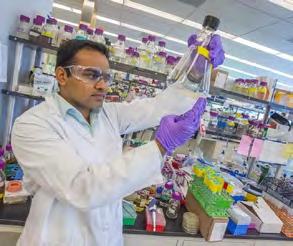
and facilitate personalized healthcare approaches. Bloomer Tech was chosen as part of the World Economic Forum’s class of 2023 Technology Pioneers.9
Deepak Dugar, a 2011-2012 student fellow, founded Visolis, which is harnessing synthetic biology to manufacture high-performance carbon-negative materials and fuels as sustainable alternatives to petroleum, with a platform that is poised to decarbonize multiple industries and reduce gigatons of greenhouse gas emissions globally.
In financial services, the majority of ventures focus on enhancing financial inclusion and expansion through technology. Examples include Adam Swartzbaugh, a 2021-2022 student fellow and Founder & CEO of Almond Fintech, a blockchain-based funds transfer infrastructure connecting financial institutions globally, and Marinella Piñate, a student fellow from the same cohort who founded Zumma based on her own experience and relationship with personal finance. Zumma offers an AI-enabled personal finance platform that helps individuals make better financial decisions. 2022-2023 student fellow Jan Berczely started Cru, a Latin American fintech company with the mission to amplify international trade through small- and medium-sized businesses by simplifying customs, financial processes, and unlocking cash flow.

Mohamed Aburawi, a 2020-2021 student fellow, is working towards equitable healthcare access for marginalized and displaced communities through Speetar, an AI-enabled telemedicine platform connecting patients to a global network of language- and culture-matched specialists. Speetar currently reaches close to 2,000,000 users.10 The community-driven telehealth platform provides affordable, quality healthcare in adverse conditions and provides a centralized location for health data to protect increasingly mobile populations, such as refugees and migrants. The platform is designed to be user-friendly and accessible, even for those with low technological literacy. This approach not only provides healthcare access but also empowers individuals to take an active role in their health management.
In the longer term, Speetar is addressing brain drain by training local practitioners and is building out telehealth infrastructure and creating sustainable solutions based on systematic data.
Aukrit Unahalekhaka, a 2015-2016 student fellow, co-founded Ricult with a colleague from MIT in February 2016. Ricult is an award-winning venture that operates across multiple South
Visolis uses synthetic biology to manufacture high-performance carbon-negative materials.Our
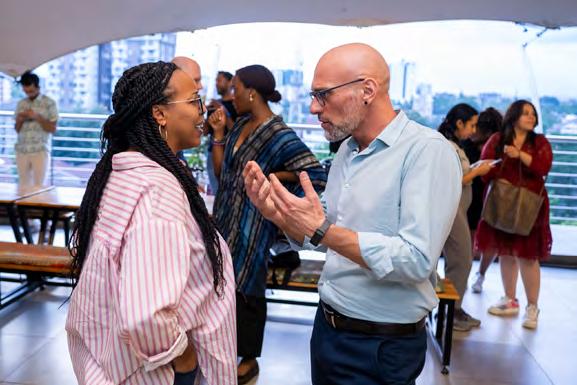

Asian countries, working with smallholder farmers. It facilitates access to credit markets for purchasing high-quality inputs, connects farmers directly with produce buyers, and provides organic farming and entrepreneurial education. Through mobile applications and daily SMS communications, Ricult empowers farmers with market knowledge. The venture has engaged nearly 850,000 farmers in Thailand and Pakistan, analyzed 500,000 acres of land using satellite data, and provided $500,000 in financial support.11 Ricult has received numerous awards, including recognition from the Royal Thai Government, the Global Social Venture Competition, the Bill & Melinda Gates Foundation, and the United Nations Industrial Development Organization. Aukrit Unahalekhaka has been honored with titles such as Tatler Asia’s Most Influential, Thai Startup CEO of the Year, and Obama Leader award recipient, among others. Reflecting on his student fellowship experience, Aukrit acknowledges the pivotal role it played in enabling him to pursue Ricult, stating that without the support received, he might have chosen a different career path.
fellows report that community is an important value offered by the Legatum Center. Ricult is an award-winning venture that facilitates access to credit markets for smallholder farmers in South Asia.

Kenya is quickly becoming a lightning rod for venture creation in Africa. The government has simplified and streamlined the process for registration of new businesses and created a number of innovation hubs, and there is a large pool of skilled labor and strong market demand from a growing middle class. It is estimated that Kenya is home to around 1.5 million formally registered SMEs, and more than 5 million informal SMEs, which together contribute 30 percent of GDP, with SMEs responsible for 30% of new jobs per year.15
Here we highlight four of the 12 entrepreneurs from Kenya who have completed fellowships at the Legatum Center. The ventures that they have built represent a range of sectors (agriculture, waste, health, energy, digital services), and the fellows represent a diversity of completion years and venture growth stages, from early stage to beyond Series B.
Notable in Kenya is the cross-collaboration between Legatum Student Fellows and Foundry Fellows, as well as operational collaboration among student fellow alumni. Collaborations include building alliances for systems change, which several ventures below are involved with. Kenya is also an example of sheer scale in terms of the millions of beneficiaries and customers reached by these ventures. Moreover, these ventures have successfully expanded to neighboring markets in Africa, with Tappi, Illumina, Sanergy, and Flare having expanded, and Safi Organics planning for expansion, as of 2023.

Kevin Kung

Legatum Student Fellow (2013-2015, PhD, School of Engineering)
Joyce Kamande
Foundry Fellow (2023)
Venture Name: Safi Organics
Sector: Organic Fertilizer
Focus: Poor Farmers, Underserved Populations
With the vision to eradicate poverty among rural farmers, student fellow Kevin Kung and Foundry Fellow Joyce Kamande co-founded Safi Organics. This social enterprise uses technology to decentralize fertilizer production in village-based units using locally available resources, labor, and waste to produce a high-yielding affordable carbonnegative fertilizer that helps farmers significantly increase their yields. Before, farmers would have to buy more expensive fertilizer, which is imported from large-scale facilities. Safi Organics reduces logistical costs for farmers by offering an alternative that is not just cheaper, it’s also better quality. The venture also has a solid positive environmental footprint, not only creating a carbon-rich fertilizer that improves the soil for generations, but also reducing particulate emissions from the previous practice of burning crop residue by over 95%. To date, Safi Organics has created 600 jobs and impacted over 10,000 poor farmers, increasing their incomes by 50%, while increasing their yields by 30%. More than 7,000 acres of land have been rejuvenated, and 60,000 tons of waste have been recycled.
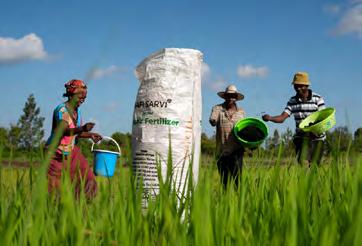

Caitlin Dolkart
Legatum Student Fellow (2015-2016, MBA, Sloan School of Management)
Venture Name: Flare
Sector: Healthcare
Focus: Underserved Populations
While Kenya technically has a national ambulance service, coverage is concentrated in urban centers, with an average response time, in 2017, of 162 minutes.16 Many Kenyans are forced to search for private local ambulances, with no guarantee that responders have the qualifications or skills to provide assistance. In this context, Caitlin cofounded Flare with Maria Rabinovich in 2017 to give Kenyans in underserved areas access to quick and safe emergency medical care. Flare consolidated a fragmented emergency response sector into a single platform which leverages state-of-the-art digital tech (merging cloud, data, and AI infrastructure) to operate a nationwide network of ambulances that connect Kenyans to life-saving services.
The subscription-based service is provided through Flare’s platform, Rescue.co, which offers affordable group (e.g. family, company, school) and individual annual memberships that offer 24/7 ambulance cover. Today, Flare is the leading provider of emergency services in Kenya, serving 2 million customers with a response time that is ten times faster than before (21 minutes compared to 167 minutes). The growing venture is also planning to expand into Ghana.17


Pulkit Shamshery
Legatum Student Fellow (2019-2021, MBA, Sloan School of Management)
Venture Name: Illumina Africa Limited
Sector: Solar Energy
Focus: Underserved Populations
Pulkit founded Illumina Africa in 2016 to deliver turnkey Photovoltaic solutions for residential, commercial, industrial, and agricultural projects in Kenya and East Africa. It recently began developing mini-grids coupled with boreholes and cold storage, increasing accessibility to the critical resources of energy, water, and agriculture infrastructure in sub-Saharan Africa, and enabling a population of over 600 million people to improve their standard of living and foster economic growth. With a deep connection to Kenya since childhood, Pulkit is dedicated to unlocking the potential of a region that is often overlooked, despite its abundance of untapped potential. Illumina Africa now provides 2.5 million customers with affordable energy and has expanded its operations in Tanzania and Uganda.

Sebie Salim
Legatum Student Fellow (2019-2020, MBA, Sloan School of Management)
Venture Name: Tenakata
Sector: Financial Services
Focus: SME Growth
Many of the over 2 million SMEs in Kenya do not maintain records, or have formal business training. Sebie launched his venture, Tenakata, in 2020 to empower small businesses in Africa by assisting with financial data management and recordkeeping through a customized mobile software solution. Tenakata promotes financial literacy through business support coaching and facilitates access to finance by leveraging the data gathered using machine learning capabilities to prequalify small businesses for funding. The platform ensures the secure sharing of reliable financial information with financial institutions in order to extend credit to these businesses and support their growth. Tenakata is licensed by the Central Bank of Kenya as a Digital Credit Provider, and is also registered as a Data Controller at the Office of the Data Protection Commissioner. Tenakata’s 15 employees currently support 2,000 customers, and the venture has an annual revenue of $250,000.



Takachar won the 2021 Earthshot Prize for its innovative technology that converts crop residue into profitable bioproducts and reduces smoke emissions by 98%, potentially extending life expectancy by up to five years.

“I am most proud of the excellent, challenging, well paid jobs I have created, as well as markets we have elucidated with data.” Student Fellow (2018-2019)
When asked to identify the elements of impact they are most proud of, surveyed student fellows referred to the ventures they have created and the impact of their products and services on others.
Some fellows referred to the jobs that they have directly or indirectly created as a result of their ventures and innovations, while the majority referred to the impacts of the ventures or innovations themselves. Several fellows also specifically cited the impact of the fellowship in enabling them to merge two fields, or to bring innovations into their field of study.
Most fellows referred to specific innovations (products or services) that their ventures introduced, the majority of which are tech-enabled. A noteworthy example is that of the 2021 Earthshot Prize winner, Takachar. Founded by Kevin Kung, a 2013-2015 student fellow who is also the co-founder of Safi Organics, the Indian startup won the award for its innovative technology that converts crop residue into profitable bioproducts and reduces smoke emissions by 98%, potentially extending life expectancy by up to five years.12
Nadia Shalaby, a 2010-2011 student fellow, is a multi-time award winner and founder of Arctic Sand (now pSemi), which specializes in designing and producing low-power semiconductors tailored for DC-DC power conversion applications. The company was acquired by a Japanese company Murata in 2017 to facilitate its ambition to transform power electronics by introducing the world’s smallest and most efficient power solutions.13
Some fellows highlighted that their innovations are a result of collective effort, and should not be attributed to a single individual. This humility was also present in some other responses, whereby fellows had made significant achievements in their fields, but were not comfortable attributing them to themselves..

“My team collectively takes the credit for our innovations as no single person would have built what we have created today in a single lifetime. If there’s an innovation that belongs to me; it’s in the infinite number of ways I’ve managed to exercise raw grit in pursuing a goal that has the potential to improve much-needed global infrastructure while being sensitive to and learning to understand, and communicate, with the wildly different human beings who make up this company today.” Student Fellow (2022-2023)
Fellows that apply a systems-change lens mainly do so by adopting a stakeholder-driven approach. Several focus on multi-stakeholder mobilization, commenting that they created partnerships that inform, influence, and gear stakeholders from different sectors to facilitate their vision for an entire sector or target group.
“A systems change approach to building [venture name] involves fostering collaboration with stakeholders across different sectors, advocating for supportive policies and regulations, and promoting mindset and behavior shifts within the agricultural landscape. By actively engaging with various stakeholders, we can collectively identify and address the root causes of agricultural challenges, ensuring that [venture name’s] impact extends beyond technology and encompasses systemic transformation.” Student Fellow (2016-2017)
Some fellows focused their impact reflections on partnerships, while others focused on changing the perceptions and behavior of specific stakeholder groups to facilitate the uptake of their product or service.
“We’re also addressing mindset and behavioral changes. Adapting to digital care isn’t just a technological shift; it’s a cultural one. By engaging with doctors in the diaspora, we’re not only reversing the medical brain drain but also fostering a more collaborative and inclusive healthcare ecosystem. This approach goes beyond traditional methods, as it seeks to build a system that’s resilient, adaptive, and forward-thinking.” Student Fellow (2020-2021)


Prakash Govindan
Legatum Student Fellow (2010-2011, PhD, School of Engineering)
Venture Name: Gradiant
Sector: Water and Sanitation
Focus: Clean Water
Prakash co-founded Gradiant in 2013, two years after completing his student fellowship at the Legatum Center.
As a fellow, Prakash was focused on developing a desalination technology to produce clean water from seawater using solar energy. The idea that he worked on during the fellowship eventually brought him to co-found Gradiant, which today is solving the world’s most important water challenges using sustainable and cost-effective technologies. Since its founding, Gradiant has evolved from a startup into a global industry leader in water solutions, with over 1,000 employees.
In 2023, Gradiant raised $225 million in a series D round, bringing the company to a total of $425 million raised and giving them unicorn status.18
Gradiant’s technology provides water solutions in a range of innovation-driven industries, like renewable energy, semiconductor manufacturing, pharmaceuticals, mining, food and beverage, textiles, and refining and chemicals. Sustainability is at the core of their work. They help customers minimize their water footprint by reducing water consumption, reclaiming valuable resources, and renewing wastewater so it can be returned to nature.
Though Prakash’s original idea as a fellow was to start and run a desalination business in India, today the company is growing rapidly and generating global impact: Headquarters in Boston, Abu Dhabi, and Singapore, and 12 regional offices, have built 2,532 water and wastewater treatment plants and partnered with companies in 90 countries to deliver Gradiant’s solutions.
Incredibly, every day, the company treats enough water to meet the needs of 48 million households.19
More than a decade later, it is fascinating to read a statement written by Prakash on his admission to the Legatum Student Fellowship.
“I applied to and was accepted by MIT because I wanted to be part of a community that creates knowledge. I am dovetailing my educational experience and my innate leadership qualities in such a way that I can solve hard problems. Lack of potable water in the developing world is one such critical problem.
I was born and brought up in Chennai, the capital of Tamil Nadu. My parents grew up in a village in Tamil Nadu, a southern province in India with very high levels of water scarcity. Unlike other states in this region, it often suffers from the lack of monsoon rain and has endured several droughts in the past decades. A rapidly depleting groundwater table and the increasing pollution of water sources are among its many water problems. Hence, it is recognized by many that there is a pressing demand for a desalination system that can use the high levels of solar insolation (6 kWh/sq. m) available in the region and convert the seawater from the Indian Ocean into potable water. Thus, this region presents the ideal business opportunity for the systems I have started to develop at MIT.
With help from the experts and mentors at the Legatum Center and by my own hard work and perseverance I believe I can start and run a successful desalination business in my hometown.20” (2010)
Though his initial idea for a venture evolved significantly in the years during and after the fellowship, the education and community he found in at the Legatum Center contributed to the eventual creation of what is today a successful, impactful venture that has enormous potential.

A few fellows focus on stakeholder mobilization specifically for regulatory reform.
“. . . by building alliances with entities like the Ministry of Health, UNDP, and WHO, we have not just created a locally driven product; we’ve embedded ourselves in the fabric of the local healthcare system. These partnerships have been crucial in navigating and influencing healthcare policies and regulations. For instance, crafting the first draft of Libya’s national digital health policy was a milestone in this journey. It wasn’t just about putting words on paper; it was about laying the groundwork for a more robust, efficient, and accessible digital healthcare system in Libya.” Student Fellow (2020-2021)
Finally, some fellows commented that their venture’s mandate or the product/service that they offer is systemic, as are their ecosystem-wide impacts.
“In essence, [our venture] strategy is all about systems change. We’re not just building a business; we’re part of a movement to transform healthcare delivery, one digital solution at a time.” Student Fellow (2020-2021)
“Shifting millions of investment to BIPOC-led communitydriven healthy food initiatives, developed new equity frameworks, built national coalitions to support healthy and equitable food and ownership in BIPOC communities across US.” Student Fellow (2010-2011)
“Being able to influence the infrastructure development of the African Continent by creating and launching … the continent’s premier marketplace.” Student Fellow (20132014)
Based on survey responses as well as our own understanding from 15 years of education and support provided to our community, the Legatum Center credits the impact seen among Student Fellows with our ability to consistently provide the following elements:
The emphasis on the cohort experience, values-based leadership, and the focus on growth markets are perceived by student fellows as differentiators of the Legatum Center, with several of the interviewed fellows noting that they did not experience this kind of support anywhere else on campus. This perception stands true amongst fellows from our earlier years to today.
85% of surveyed fellows felt the fellowship helped improve their overall experience at MIT.
Fig 7. Do you remain in contact with the Fellows in your cohort?
11.76% Not at all
22.35% Not much
48.24% Yes, to some extent
10.59% Yes, to a great extent
7.06% Yes, to a very great extent
Fig 8. Would you like greater connection with the Legatum community?
14.12% Maybe
85.88% Yes
“I believe the Legatum Center has a unique place and perspective within MIT. You have the Martin Trust Center and 100k Competition to start a business, and D Lab on how to propose a product or service to solve a social problem. However, none of those centers cover the mix of how to start a business to solve a social problem. There are specifics, and the reason why many people fail is because they think it is the same. If you have the wrong investors, the wrong business model or team, you will fail without knowing why.” Student Fellow (2010-2011)
The center provides incoming fellows with the space to convene, meet, and connect with like-minded people; feel cared about; and work towards a shared purpose. All these factors are integral for a strong sense of community on campuses.14 Based on the student fellow survey results, a majority of surveyed fellows (85%) feel the fellowship helped improve their overall experience at MIT, and 80% believe that a key aspect of the fellowship was the space to meet like-minded people. More than half of respondents (59%) felt that the fellowship created a safe environment for honest conversations.
“A very useful component of the fellowship was the community because it was a really diverse group of people talking about their ventures. Each one had different angles, some people were more technical, some already had something very specific from their own markets, others were still exploring. The second aspect was support to actually try out things. We had a community of likeminded people that gave you encouragement to just get out and try, and the worst that can happen is that you will fail, but still learn, and move on. I think those are the things that are quite special about the experience.” Student Fellow (2008-2009)
Most surveyed student fellows (66%) are still in contact with their cohort, and the majority (86%) would like even more connection with the Legatum Center community moving forward.
“Being part of the Legatum Fellowship was like being in a special club where everyone’s rooting for each other. We shared challenges, solutions, and even a few laughs over late-night coffee sessions. This camaraderie was not just comforting; it was inspiring, driving us to push through tough times.” Student Fellow (2021-2022)
Fig 9. Was the fellowship a valuable experience for you?
2.06% Not much
4.12% Yes, to some extent
26.80% Yes, to a great extent
67.01% Yes, to a very great extent
Our community has grown with the addition of the Foundry Fellows, who not only have formed their own cohorts but also support student fellows by sharing their expertise and feedback.
“[Foundry Fellows] are great, they’re people who have done [entrepreneurship] and have done it well. They’re a source for advice. I am frequently in touch with one of the Foundry Fellows and he is my unofficial mentor now.” Student Fellow (2022-2023)
For student fellows, it seems that community ties can weaken as more time elapses after graduation. They believe that more effort needs to be spent on reviving connections between and across cohorts. Interviewed Foundry Fellows also believed that follow-on refreshers and tools to facilitate connections to the wider Legatum Center community would also be beneficial for sustaining the impact of their fellowship.
The vast majority of surveyed student fellows (98%) believe that the fellowship was a valuable experience; 62% of surveyed student fellows see the financial support received as critical to accessing their MIT education and pursuing an entrepreneurial pathway. Added value was derived from an expanded ability to start a venture and from support in the decision to pursue or proceed with an entrepreneurial path and move away from corporate or consulting jobs. In commenting about financial support, some fellows highlighted how this is especially important for graduate students with familial responsibilities or pressure to pursue a traditional career path.
“I wouldn’t have been able to develop my company or pursue an entrepreneurial path as I would not have had the tools and inspiration to continue innovating in emerging markets. I would have had to go back to my corporate job to pay for loans had I not had the support of the Legatum Center. I do not say this lightly but [my venture] would not continue existing if it wasn´t for the Legatum Center.” Student Fellow (2017-2018)
Fig 10. Did the Legatum Fellowship help you gain useful knowledge, skills and insights?
4.08% Not much
16.33% Yes, to some extent
32.65% Yes, to a great extent
46.94% Yes, to a very great extent 15 Years of Impact
Student fellows noted the significant impact that the fellowship has had on their confidence and capacity to pursue entrepreneurial pathways and innovation-driven venture building in growth markets. The majority of surveyed student fellows (96%) gained useful knowledge, skills and insights from the fellowship, primarily in the areas of entrepreneurship, networking, and leadership. Surveyed student fellows primarily referred to entrepreneurial strategy (74%), business modeling (70%), market
79% of surveyed fellows believe that the fellowship helped them access useful external networks.
assessment (50%), and building effective teams (47%) as particularly helpful topics covered in the fellowship.
“Legatum gave me a more holistic understanding of how to build a business in an emerging economy.” Student Fellow (2022-2023)
Student fellows value gaining a better understanding of venture building in emerging markets, and access to connections, mentorship, and in some cases venture capital. Specifically, 79% of surveyed student fellows believe that the fellowship helped them access useful external networks. The deepened understanding of emerging markets translated to a determination or commitment to markets, or an enhanced ability to work within these economies. This is true for both student fellows who pursued an entrepreneurial path, and those who are working in governmental, corporate or non-profit jobs but with an emerging market focus.
“I developed a real passion for emerging markets during my time at Legatum… I tried to get my own venture up and running but I wasn’t in a position to do this full time. … I got a consulting opportunity in South America, with a focus on helping consumer goods companies grow and realized that I can have a massive impact on many, many lives. I have worked in Ethiopia, Congo, Cambodia, Indonesia and I consider myself an advocate for emerging markets. I started off with the intention to create a venture on my own, my path has basically merged into something different, but it is still deeply connected to emerging markets.” Student Fellow (2008-2009)
Interviewed and surveyed student fellows also noted that the fellowship enabled them to become more thoughtful about their work, to better connect to their ‘why’ and the values that drive their work, and to work on a venture that they are passionate about. In fact, 90% of surveyed student fellows believe that the fellowship helped them identify and define their core values as entrepreneurs.
Fig 11. Did the Legatum Fellowship help you identify and define your core values as an entrepreneur and as a leader?
10.00% Not much
18.89% Yes, to some extent
24.44% Yes, to a great extent
46.67% Yes, to a very great extent
“I hope, and think, I am more thoughtful about certain approaches, the why of what I do, and how to evaluate the overall impact that I am able to make through my professional pursuits.” Student Fellow (2019-2020)


Here we highlight the successes and impact of four of our Legatum Student Fellows from Mexico. Each identified a pressing social and economic problem and created an innovative venture to disrupt traditional systems, serve underserved communities, and create prosperity. Taken as a whole, these ventures have changed industry paradigms; generated significant employment opportunities; enhanced financial inclusion; and spearheaded new legislation. They have offered underserved populations previously unavailable access to opportunities for increased wealth and well-being.
According to the World Bank, Mexico continues to struggle in the areas of poverty reduction and financial inclusion. For its over 127 million population, 36% live below the subsistence level and 7.1% live in extreme poverty. Income inequality is also a significant issue in Mexico; with a Gini coefficient of about 0.5, Mexico is on the list of high-inequality countries.
In this context, a handful of talented, innovative, and community-focused entrepreneurs are making strides towards a better future for the country and its people.
 Javier Lozano
Javier Lozano
Legatum Student Fellow (2009-2010, MBA, Sloan School of Management)
Venture Name: Clínicas del Azúcar
Sector: Healthcare
Focus: Underserved Populations
Clínicas del Azúcar is the world’s first datadriven retail clinic providing specialized and convenient diabetes care. With 40 clinics nationwide, it is the largest network of private, low-cost diabetes clinics in Mexico. Diabetes is one of the leading causes of death in Mexico, with approximately two out of every 10 Mexicans suffering from the disease, and a majority of diabetes patients lacking access to healthcare. Lozano’s venture leverages digital technology to introduce innovative, evidence-based algorithms for diagnostics and care and offers preventive and supportive care to underserved Mexicans both virtually and through in-clinic consultations. Clínicas del Azúcar offers unlimited consultations for an annual fixed fee, a model that could drastically reduce the cost of treating chronic diseases globally. Clínicas del Azúcar employs 700 people and has served 320,000 patients, providing 1.2 million consultations annually. Clínicas del Azúcar is now expanding its geographic reach and is scheduled to open its first clinic in the United States.


Legatum Student Fellow (2015-2017, MBA, Sloan School of Management)
Venture Name: PlayBusiness
Sector: Fintech
Focus: Underserved Populations
With a background in the banking sector, Fernanda co-founded Play Business in 2014 to incentivize the growth of innovative enterprises by giving entrepreneurs access to financing through a unique equity crowd-funding model. In Mexico, only 37% of adults have bank accounts, with just 32% making or receiving payments. Moreover, the nation has an 8-percentage-point gender gap in access to financial resources, further exacerbating the number of underbanked people in the country.
Play Business is democratizing investing, helping thousands of middle- and low-income Mexicans become first-time investors, while also providing much-needed financing for SMEs. The venture has financed over 150 SMEs and has 150,000 platform users, of which 8,000 are recurring investors. Moreover, Fernanda and her team were instrumental in working with the Mexican government to develop a supportive policy in the country’s first fintech law, and their venture is creating a community that is catalyzing the culture of entrepreneurship in Mexico and Latin America.


Legatum Student Fellow (2014-2015, MBA, Sloan School of Management)
Venture Name: Aguafría
Sector: FMCG
Focus: Underserved Populations
After graduating from Sloan, Germán returned to Mexico with his friend, MIT classmate, and business partner José Pablo Fernández, with the intention to launch a search to identify and invest in an existing Mexican venture. The genesis of Aguafría was the 2017 purchase of an ice production company that was established in 1890 and owned by Heineken. Over the years, more facilities and ice producing companies were purchased, consolidating what has traditionally been a fragmented sector. Efforts to streamline and upgrade production and supply included updating current product offerings; offering new products; and introducing new technology to better serve customers, monitor and manage inventories, and upgrade the distribution system. Under Germán’s stewardship as CEO, Aguafría has become the largest ice producer in Mexico, delivering ice to over 13,000 locations owned by over 6,000 customers in 19 of Mexico’s 31 states. Aguafría has 900 direct employees, and creates employment opportunities for over 1,000 individuals indirectly.


Legatum Student Fellow (2021-2022, MBA, Sloan School of Management)
Venture Name: Zumma
Sector: Fintech
Focus: Middle Income Customers
With a background in fintech, specifically digital consumer banking, Marinella recognized that there was a lack of financial literacy, financial knowledge, and familiarity with financial tools among the Latin American middle class. Her venture, Zumma, is a digital personal finance and investment platform that leverages AI to give individuals across Latin America the opportunity to build wealth and help close the financial inequality gap. In Mexico alone, 40% of the population in 2021 was deemed ‘financially excluded’ with no access to formal financial services. Zumma is one of several fintech ventures in the region that aims to address this. Zumma allows users to invest in domestic and international markets, through a transparent and user-friendly interface. Zumma has surpassed 8,000 users in its first year.

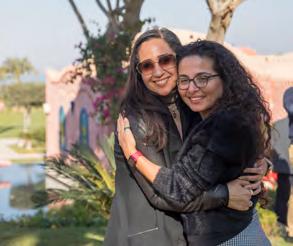
The Foundry Fellowship guides successful entrepreneurs through a program that builds on their significant experience and exposes them to frameworks and tools that offer new perspectives, both on how to tackle adaptive challenges and on how to meet newly considered opportunities.
In the first two years of the fellowship (2021-2023), 23 entrepreneurs from ten diverse markets across Africa completed the program, resulting in reported enhancements in leadership capabilities, exposure to novel opportunities for venture expansion within Africa, and heightened personal dedication to fostering ecosystem development.
As a result of participation in the Foundry Fellowship, 79% of the 15 fellows who responded to a final survey reported that they changed their venture approach or strategy to focus more on expansion within or engagement within Africa, and 64% were able to build partnerships with stakeholders in new ecosystems.
71% of Foundry Fellows reported that, as a result of the fellowship, they changed their perspective on the opportunities that exist in Africa.
“When I first started the fellowship, I had a vision of creating a pan-African venture capital firm with on the ground presence, led by Africans. The first step in that process was to create a relationship with a potential partner in Nigeria, the largest tech market in Africa. At the time, I decided to enter into a relationship with another fellow from my cohort where she would become a venture partner on our first fund. My experience at the fellowship gave me the boost to push to elevate that relationship to a full partnership. We both now hope to replicate that model in Kenya, which is also a key market for our investment thesis. My Kenyan fellows are helping me to achieve this.” Foundry Fellow, Egypt
71% of Foundry Fellows reported that, as a result of the fellowship, they changed their perspective on the opportunities that exist in Africa.
“I now invest more as an angel investor.” Founty Fellow, South Africa
“After sharing the experience in Egypt with my team, we are currently factoring in the expansion plan of [venture name] to also build a franchise in Egypt in the next five years. I found North Africa as a suitable market for organic fertilizer production.” Foundry Fellow, Kenya

“Consciously looking for opportunities to collaborate across the continent. I have since followed up and had meetings with MIT-Solve and MIT D-Lab fellows in Nigeria and Republic du Benin.” Foundry Fellow, Nigeria
Upon completing the program, several Foundry Fellows made the decision to launch new initiatives or ventures to strengthen innovation and entrepreneurship on the continent.
“I was able to refine my ideas and launch my [Deep Tech] venture.” Foundry Fellow, Rwanda
“Starting a venture studio [in Egypt] was inspired by my learnings and experiences in the fellowship.” Foundry Fellow, Egypt
“Creating [an] online program to enable more young pharmacists to set up high-quality practices in Nigeria.” Foundry Fellow, Nigeria
64% of Foundry Fellows were able to build partnerships with stakeholders in new ecosystems.

“As an organization, we decided to take on the talent challenge Africa faces. The ‘developed world’ recruits the best teachers. Since the world needs African teachers, we will train teachers on such a scale that we will fulfill both the needs of our group, of the continent, and of the world. Talent is abundant on the continent.” Foundry Fellow, South Africa
“Expanding in Africa is a clear goal for me now.” Foundry Fellow, Egypt
A full 100% of fellows surveyed reported that their personal commitment to playing the role of ecosystem builder/leader in Africa increased as a result of the fellowship.
“There is a more heightened awareness of the important role I have assumed within the ecosystem as an entrepreneur. I also feel a greater sense of responsibility to leave it in a better form than when I first met it.” Foundry Fellow, Nigeria
For Foundry Fellows, being a part of a lifetime community of entrepreneurs and ecosystem leaders has significant meaning.
“I am part of a privileged community and I now have a pan-African network (family) of like-minded individuals who are passionate about the growth of the entrepreneurial ecosystem in Africa. Who understand the challenges and nuances of Africa and are taking courageous steps to standout and tackle those challenges through leadership. The fellowship has made me feel closer to the represented countries through this Foundry Fellowship family.” Foundry Fellow, Nigeria
99% of MCI Bootcamp participants gave the program a perfect score when evaluated.
MCI bootcamps explore the principles and frameworks needed to create new markets that make products and services affordable for everyone. Thus far, we have been able to reach 148 innovators in Kenya, Nigeria, Uganda, Rwanda, and Senegal.
Nearly all (99%) of participants gave the program a perfect score when evaluated.
“MCI has changed my perspective and approach towards business. My biggest take away and motivation was the fact that I am a nation builder! It’s easy to lose courage and momentum when it gets hard but knowing that I am building what I am building for this country makes it all worth it!” MCI Participant, Rwanda
“I would say that one takeaway that I have acquired from the MCI training is that Market Creating Innovation is more than just products or services. These are entire systems which have potential to create immense wealth and prosperity.” MCI Participant, Kenya

25
7
13
65
An important objective of the Legatum Center at MIT is to generate research and ideas that promote the principles of entrepreneurship around the world, and to influence how entrepreneurship in growth markets is understood at MIT and in the world at large.
Outcome 1: Our online content and in-person events have influenced leading voices and are changing the narrative about the opportunity of entrepreneurship in growth markets. We have had 3.7 million impressions across social media, and 3,800+ reads of our publications.
As with all thought leadership endeavors, understanding the true impact of new ideas and new perspectives is difficult; however, we offer one concrete example here to illustrate how our work has influenced some of the leading voices working toward prosperity in growth markets. In July 2021, Efosa Ojomo, co-author of the popular book, The Prosperity Paradox: How Innovation Can Lift Nations Out of Poverty, wrote a blog for the The Clayton Christensen Institute titled, Exit Emerging Economies, Enter Growth Economies; a Long-overdue Name Change 21 From the blog:
“Names matter, which is why moving forward, the Christensen Institute will refer to non-OECD countries as “growth economies”. The next wave of global economic, population, and workforce-population growth will come from these countries, so let’s start to call them by a more positive and descriptive name.
Efosa first heard the term “growth economies” while having a conversation with a friend, Dina Sherif. Dina is the Executive Director of the MIT Legatum Center for Development and Entrepreneurship.”
We organized 65 events from 2014 to 2022, and conservative estimates suggest an average of 100 attendees per event.
The purpose of these events was to amplify our message and to raise the profile of the Legatum Center’s work. The topics of focus were all directly related to achieving our mission of building prosperity in growth markets through entrepreneurship. Each
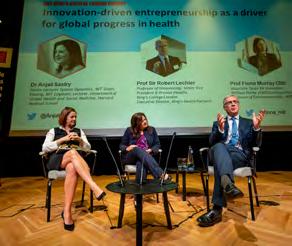
Events, including roundtables, webinars, and panel discussions, have raised the profile of the Legatum Center while changing the narrative about opportunity in growth markets.
filled a gap in what was being produced from MIT and in the wider market—we produced what we wanted to offer our fellows and our community because we did not see these topics being discussed elsewhere. Example topics included:
• Growth Trends in Emerging Markets (2022)
• The Role of Venture Capital in Building Inclusive Growth in Emerging Markets (2020)
• Importance of Startup Communities for Emerging Market Growth (2020)
• Innovating for Prosperity: Reimagining Healthcare During & After Covid-19 (2020)
• Building Digital Solutions with Data in Frontier Markets (2019)
• Building Technologies for Financial Inclusion: MIT alum company PayJoy (2019)
• Affordable & Clean Energy and Entrepreneurship (2018)
• Manufacturing in Frontier Markets (2018)
• Tech Trends and Investment in Southeast Asia with Peng T. Ong (2018)
• Peace through Entrepreneurship with Steven Koltai (2017)
• MIT Scaling Development Ventures Conference (2016)
• Pitching Your Venture for Developing World Ventures (2016)
• The Accelerating Evolution of Capitalism (2015)
• Giving Voice to Values: The “How” of Values-Driven Leadership (2015)
• Product Development for Low Income Markets (2015)
• Exploring Global Prosperity: Legatum Prosperity Index (2014)
• Next Generation Strategies for the Base of the Pyramid: Stuart Lloyd Hart (2014)
• Gearing Up in a Global Market (2013)

Outcome 2: Developing relevant case studies from growth markets improves the education of our student fellows and other students of entrepreneurship.
Over the years, the Legatum Center has produced 14 case studies focused on innovative ventures in growth markets, led by principled entrepreneurs. As the center began educating entrepreneurs, it noted a lack of cases that fit this profile and began to fill the gap. In a 2014 piece written for “innovations” magazine, Iqbal Quadir noted, “As the center builds up its library of cases, it is compiling both a roster of the problems entrepreneurs may encounter in low-income countries and an extensive, in-depth collection of possible ways to overcome these problems. Some of the center’s cases are already being used at Harvard and Tufts”.22

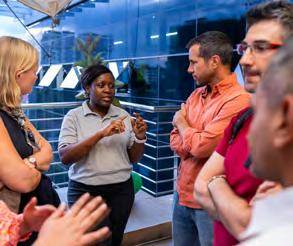
Ecosystem tours have become an important way to strengthen and grow the community of stakeholders that engage with our fellows.
These cases have not only supported the teaching of fellows at the Legatum Center, they are disseminated within MIT Sloan and to other business schools around the world. Key partners in the dissemination of these case studies are the MIT Learning Edge platform and The Case Center, a UK-based organization specialized in the development and global dissemination of case studies for management education in business schools. Many cases focus on ventures cofounded by Legatum Student Fellows, like “Soko Jewelry, Fast Fashion, and Building a Virtual Factory” (2018); “MAX: Kickstarting Last-mile Logistics in Lagos” (2017); and ”Scaling Sanergy: Growing a Promising Sanitation Start-up.” (2018).23
Outcome 3: Publications and ecosystems tours lead to new partnerships and collaborations for the Legatum Center and our fellows.
We also actively disseminate insights from our research, and share knowledge and perspectives through our blog, with 53 published blogs to date. We capitalize on digital platforms, such as Issuu, and our seven digital publications to date have garnered a total of 1,920 views on that platform. A blog titled, Will COVID-19 Change Investor Behavior? The hope we hold on to, 24 written by Dina Sherif and Adel Boseli, led to additional webinars on similar topics, and eventually was the catalyst for an inperson roundtable in Dubai in 2023. That roundtable led to new relationships, including with several investors who have now become Professional Advisors with the Legatum Center.
Finally, in the first two years of the Foundry Fellowship, we engaged 171 innovation and entrepreneurial ecosystem stakeholders during ecosystem tours. These stakeholders span the United States (Boston, Detroit, and Miami), Egypt (Cairo), the United Arab Emirates (Dubai), Ghana (Accra), and Senegal (Dakar), and represent leading experts in governments, universities, corporations, entrepreneurs, and risk capital providers. Through these tours, our fellows have gained mentors and found collaborators for venture expansion, and the stakeholders have learned about new opportunities for investment and engagement within African innovation and entrepreneurial ecosystems.
The Legatum Center has become a space for leading thinkers to gather to discuss how to support innovation-driven entrepreneurs to build global prosperity.


Our continued growth and evolution is founded on an evidencebased view of the unique types of support that entrepreneurs from growth markets need.
We have identified several areas for increasing our impact on current and future entrepreneurs in global growth markets through targeted programming, community building, and ecosystem support. The below section provides details on our proposed direction for the way forward.
Our goal is to create opportunities for innovators in growth markets to thrive. Though we have focused pilots of our Foundry Fellowship, BRAIN, and MCI bootcamps in Africa, we plan to analyze results and determine what valuable elements can be scaled, and which additional markets they might be scaled to, thus expanding our reach to, potentially, entrepreneurs in Latin America, the Middle East, and South and SouthEast Asia.
In Africa, we will continue to refine our successful bootcamp model to better reflect the contextual realities of entrepreneurship challenges and opportunities on the continent, while adopting mechanisms to continue to expand. Ideas include developing an online version of the bootcamp, creating more partnerships with regional universities and ecosystem players, and developing a bootcamp facilitator certification training program, all with the intent of increasing the bootcamp’s scope, scale, and sustainability.
We aim to increase our long-term impact by building a ‘community of communities’, whose members are deeply engaged as leaders of high-impact ventures, strengtheners of innovation and entrepreneurial ecosystems, and creators of opportunities for prosperity at scale.
We believe that community building is critical to our success, and we’re exploring innovative knowledge transfer platforms and shared learning experiences to help our fellows connect and collaborate like never before. Efforts to build three vibrant communities are underway:
1. A community of entrepreneurs, composed of the Legatum Student Fellow and Foundry Fellow alumni;
2. A community of risk capital players interested in growthmarket opportunities; and
3. A community of universities focused on supporting entrepreneurship education and innovation ecosystems in growth markets.
Legatum Center for Development and Entrepreneurship at MIT
The Legatum Center’s community of communities will only grow and deepen in the future.

Building a stronger community of entrepreneurs requires investment in opportunities for meeting and connecting, such as developing short in-person and online refresher courses for alumni fellows, and reviving our annual in-person forum. An online searchable database of all fellows, ventures, and network members would connect fellows across cohorts, and keep alumni updated on our programming and events. Proactively continuing to engage Foundry Fellow and Legatum Student Fellow alumni from previous years through mentorship, speaking engagements, and other forms of connection and engagement will allow us to feature their stories across the network, while supporting our thought leadership programming through the guidance, resources, and connections they can offer to new fellows.
Finally, creating sectoral and regional working groups can help us continue to raise the profile of the center and lead to new opportunities to build impactful partnerships.
The information collected through this community will continue to strengthen our programmatic offerings and enable us to further the connections and value offered between MIT and the world. We are proud of the fact that Legatum Student Fellows have created 286 ventures, and that 75% still exist today; however, we note that only around half (47%) of these ventures sustain their focus on growth markets. One of the reasons why we now focus heavily on sharing country assessments in the student fellowship curriculum is to emphasize the opportunity that exists for fellows to leverage the center’s community and establish their base in the actual growth market where they are from.

There is an increasing number of entrepreneurs worldwide committed to solving complex problems, like sustainable and affordable access to water, education, sanitation, healthcare, and housing, and achieving climate-change mitigation. Our fellows are no exception. The center will accelerate the development of new system-change frameworks, tools, and case studies in support of entrepreneurs solving complex problems at scale by addressing structural systemic barriers (e.g. policies and regulations, limited infrastructure, and people’s mindsets). This work will expand the application of MIT Sloan’s pioneering work on systems thinking and leadership to growth market entrepreneurship and will enable the MIT community to continue learning about new systemic market-based solutions developed by growth-markets entrepreneurs.
Developing and growing a deep tech startup can be a complex and challenging process. It requires not only an understanding of the technology itself, but also the ability to navigate the rapidly changing landscape of the industry, develop a solid business strategy, build a strong team, de-risk the process of development, and access a supportive ecosystem.
A two-pronged approach that addresses the knowledge and skills of both founders and ecosystem stakeholders in Africa is required to advance this important sector. Building on the successful 2023 pilot delivered in partnership with Open StartUp Tunisia, we will engage MIT Sloan EMBA students who have demonstrated commitment to the program and identify ways to scale the same opportunity to markets that show strong potential for deep tech industry growth.

The power of storytelling cannot be underestimated, and by showcasing the diverse range of entrepreneurial ventures and their contributions to Africa’s growth, we can effectively challenge the stereotypical portrayal of the continent and foster a fresh perspective of innovation, opportunity, and optimism.
As the second-largest and second-most populous continent, Africa is home to some of the world’s fastest growing economies.25 Africa is set to outperform any other country or continent in terms of economic growth, with a real gross domestic product (GDP) of 4% in 2023 and 2024,26 thus it is an important market for our programs and a focus for our work on shifting the narrative on the
Photo from sessions during the Deep Tech Innovation Bootcamp, held in Cairo in March 2024.

opportunity that entrepreneurs are creating to build prosperity in growth markets.
Just as Wamda successfully established itself as a platform driving entrepreneurial ecosystems across the MENA region, we can create that same impact for Africa, by creating a dedicated platform, or collaborating with existing platforms, to share Africa’s remarkable success stories, inspire aspiring entrepreneurs, and attract investments and partnerships from around the world.
Thought leadership at the Legatum Center is in service of the education of fellows and enabled by the communities that we collaborate with at MIT and in growth markets. We will continue to grow our influence by developing our thought leadership work.
Three white papers published after the period under review in this report, but that demonstrate our commitment to capture stateof-the-art knowledge are shared here:27
“Unlocking Value in Broken Markets: A Framework for System Change Entrepreneurs” (Feb’24)
This paper lays out a new framework for understanding the different ways in which entrepreneurs unlock value in broken or dysfunctional markets. Based on the study of how successful business and social entrepreneurs are transforming markets for growth and impact, this framework is intended to help the new generation of system change entrepreneurs to identify the strategic choices they will face when transforming broken markets. This innovative framework has been applied in sessions with two cohorts of Legatum Student Fellows and Foundry Fellows. The paper is co-author by Valeria Budinich, a Legatum Center Scholar in Residence, and Archis Mahajan.
“Pan-African DeepTech: Key To Sustainable Prosperity” (Feb’24)
Embracing deep tech innovation—the kind of innovation grounded in advances at the frontier of science and technology— in Africa has the potential to drive sustainable growth, improve living standards, and bring stability and resilience. The paper, authored by Haitham Khoury, the Legatum Center’s Director of Fellowships and Global Initiatives, summarizes discussions and conversations with more than 40 ecosystem stakeholders from 17 countries across Africa that took place at the BRAIN bootcamp in Tunisia in 2023. It is intended to influence the building of a PanAfrican Deep Tech Ecosystem in partnership with the International Finance Corporation (IFC), leading African VC funds, and local African partners in the deep tech space.

This white paper synthesizes the outcomes of a virtual panel and roundtable discussions on the women-waste-climate nexus.
The nexus concept was developed under an EngineeringX—an international collaboration of the Royal Academy of Engineering and Lloyd’s Register Foundation—and an International Development Research Center grant. The Legatum Center served as co-host of the event and Foundry Fellow Dalila Khaled was the lead author of the paper.
The center aspires to create a platform that connects entrepreneurs, investors, academics, and policymakers in a dynamic exchange of ideas and insights, through the convening of regular policy roundtables on innovation ecosystems. This platform can serve as a catalyst for transformative change, driving policy around innovation-driven ecosystems and creating opportunities that resonate beyond borders.

In the future, the center will continue to produce case studies on growthmarket entrepreneurs that can be integrated into curricula at MIT and other universities.
Our collaborations with the MIT ecosystem already create shared value for our Legatum Student Fellows and Foundry Fellows. Producing more case studies focused on emerging markets that highlight our fellows’ ventures, and integrating these case studies within MIT Sloan core undergraduate curriculum, will increase awareness of how entrepreneurship (and our fellows) are creating prosperity.
In order to meet the opportunity of our mission, the center is working towards financial sustainability by building a base of support among high-net-worth individuals that are invested in, and in many cases, originate from the global growth markets where we focus. The shared commitment to see these markets flourish through strengthened and better-connected innovation and entrepreneurial ecosystems provides a solid foundation for long-term and fruitful partnerships.
We would like to sincerely thank the countless people who supported us in the pursuit of our mission over the past 15 years. To our cofounders, the partners at Legatum—Christopher Chandler, Mark Stoleson, Philip Vassiliou, and Alan McCormick— and Iqbal Quadir, and to our donors and supporters, we honor your commitment to us and our work, and we humbly thank you for your trust and partnership. To the many MIT faculty, and most especially to our Faculty Director, Professor Dame Fiona Murray, we offer gratitude for your guidance and support, and for all the ways that you offer our fellows and entrepreneurs an exceptional opportunity to engage with your expertise.
Completing this report would not have been possible without the input from our donors, MIT faculty, staff of the Legatum Center, and our community of fellows, learning experience participants and varying entrepreneurship and innovation ecosystem players from around the world. To those who diligently and tirelessly worked on this report: Diana Perez Buck, Dr. Salma El Sayeh, Nihal Sharara, Rania Helmy, Jennifer Brady, Valeria Budinich, and Dina H. Sherif, our 15 year journey would not have been told without you.
We would also like to sincerely thank the team at Legatum, particularly Graham Alltoft, Head of Data, and Matthew Linnell, Associate General Counsel, for their expertise and patient support throughout the report-production process.
We also want to thank James Mattison, Michael Stojkovic, and Luisa Stojkovic at Magnia, who beautifully designed this report and deftly supported us in the final production stages.
Last but not least, the Legatum Center would like to thank the team that makes all of this work possible. As of the writing of this report, our wider team includes:
• Professor Dame Fiona Murray, Faculty Director and Professor of Entrepreneurship, MIT School of Management
• Dina H. Sherif, Executive Director and Senior Lecturer at the Sloan School of Management
• Rania Helmy, Senior Advisor, Strategy and Partnerships
• Artafern Afsar, Director of Finance and Administration
• Haitham Khoury, Director of Fellowships and Global Initiatives
• Jennifer Brady, Senior Advisor, Foundry Fellowship
• Marc Alain Boucicault, Director of Marketing and Stakeholder Engagement
• Philip Rigeur, Entrepreneur in Residence
• Valeria Budinich, Scholar in Residence
• Donovan Beck, Communications and Storytelling Specialist
• Jacquelyn Gasparek, Program Coordinator for Global Initiatives and Fellowships
• Eileen Carney, Senior Administrative Assistant
• Islam Elanany, Administrative Assistant
• Khadija Ba, Researcher
• Felicia Appenteng, Advisor
“Who is to say that there are no new ideas brewing in the young minds now attending MIT and other universities? There must be new Gutenbergs, Days, Fords, Singers, and Krocs— hailing from low-income countries—who can unleash new possibilities in their home countries. They simply need to be nurtured, inspired, and exposed to the entrepreneurial possibilities that exist.”
– Iqbal Quadir, Co-founder, the Legatum Center at MIT
1 Dornberger, Utz. “Pro-Growth and Pro-Poor Growth Approaches in Private Sector Development Strategies.” Private Sector Development and Poverty Reduction: Experiences from Developing Countries (2005): 4.
2 UNCTAD. Trade and Development Report. 2005. https:// unctad.org/system/files/official-document/tdr2005_ en.pdf
3 Sneha, C. J., and B. Vignesh. “Impact of Startups in Indian GDP in 2022.” EPRA International Journal of Multidisciplinary Research (IJMR) 9, no. 1 (2023).
4 The World Bank. Small and Medium Enterprises (SMEs) Finance. 2019. https://www.worldbank.org/en/topic/ smefinance#:~:text=SMEs%20account%20for%20the%20 majority,than%2050%25%20of%20employment%20 worldwide.
5 Sajjadian, Fatemeh, Mirahmad Amirshahi, Neda Abdolvand, Bahman Hajipour, and Shib Sankar Sana. “Understanding the failure process of ventures: a perspective of the behavioral strategy.” Journal of Modelling in Management (2024).
6 Ibid.
7 USBLS. “34.7 percent of business establishments born in 2013 were still operating in 2023” (2024). https:// www.bls.gov/opub/ted/2024/34-7-percent-of-businessestablishments-born-in-2013-were-still-operatingin-2023.htm
8 Data shown in Figure 3 (Geographic distribution of active ventures by country), Figure 5 (Regional distribution of active ventures), and Figure 6 (Sector focus of active ventures) includes information on 160 of 214 active ventures.
9 Bloomertech. “Bloomertech awarded as 2023 technology pioneer by World Economic Forum.” (2023). https://www. bloomertech.com/blog/bloomer-tech-awarded-as-2023technology-pioneer-by-world-economic-forum
10 Solve. “Equitable Health Systems: Speetar.” n.d. ”https:// solve.mit.edu/challenges/equitable-health-systems/ solutions/61794
11 Ricult. https://www.web.ricult.com/
12 Newswires. “Prince William’s Earthshot Prize event validates importance of support for climate innovation.” (2021). https://www.einnews.com/pr_news/554399663/ prince-william-s-earthshot-prize-event-validatesimportance-of-support-for-climate-innovation
13 Other award winners based on the survey are Almond FinTech and Out of the Box Education, Inc.
14 Cheng, David X. “Students’ sense of campus community: What it means, and what to do about it.” NASPA journal 41, no. 2 (2004): 216-234.
15 USAID. “Small Business Development Centers.” 2023. https://www.usaid.gov/kenya/document/small-businessdevelopment-centers
16 Fellow Portrait Caitlin Dolkart Flare “A subscription-based emergency-response infrastructure that centralizes ambulance dispatch and connects Kenyans to life-saving services” Cartier Women’s Initiative Website: https://www. cartierwomensinitiative.com/fellow/caitlin-dolkart
17 Flare. https://www.flare.co.ke/
18 Arakali, Harichandan. “Gradiant is a unique unicorn: Prakash Govindan.” Forbes India. (2023). https://www. forbesindia.com/article/leadership/gradiant-is-a-uniqueunicorn-prakash-govindan/85745/1
19 Gradiant. “About us.” https://www.gradiant.com/aboutus/
20 Legatum Center. “Entrepreneurs: Prakash Narayan Govindan.” https://legatum.mit.edu/entrepreneur/ prakash-narayan-govindan/
21 Ojomo, Efosa. Exit Emerging Economies, Enter Growth Economies; a Long-overdue Name Change (2021). https:// www.christenseninstitute.org/blog/exit-emergingeconomies-enter-growth-economies-a-long-overduename-change/
22 Quadir, Iqbal Z. “Inclusive Prosperity in Low-Income Countries (Innovations Case Narrative: The Legatum Center for Development and Entrepreneurship, MIT).” Innovations: Technology, Governance, Globalization 9, no. 1-2 (2014): 65-84.
23 Case studies available for download here: https://legatum. mit.edu/resources/legatum-case-writing-program/
24 Sherif, Dina H. and Adel Boseli. “Will COVID-19 Change Investor Behavior? The hope we hold on to” (2020). https://legatum.mit.edu/will-covid-19-change-investorbehavior-we-sure-hope-so/
25 Chironga, M., A. Leke, A. van Wamelen, and S. Lund. “The globe: Cracking the next growth market: Africa: Harvard Business Review.” (2011). https://hbr.org/2011/05/ the-globe-cracking-the-next-growth-marketafrica#:~:text=According%20to%20UN%20data%2C%20 Africa,can%20no%20longer%20ignore%20Africa
26 African Development Bank. “Africa’s economic growth to outpace global forecast in 2023-2024 – African Development Bank biannual report.” (2023). https://www. afdb.org/en/news-and-events/press-releases/africaseconomic-growth-outpace-global-forecast-2023-2024african-development-bank-biannual-report-58293
27 Publications available for download here: https://legatum. mit.edu/research-reports/
Massachusetts Institute of Technology
292 Main Street, E38-5th Floor
Cambridge, MA 02142-1605 USA
Telephone: +1 617 324 2768
Email: legatum@mit.edu
Website: legatum.mit.edu